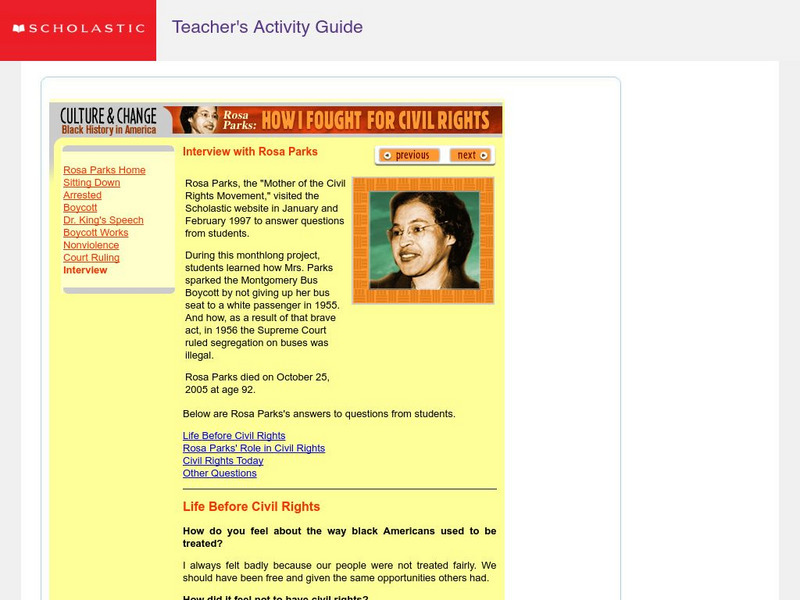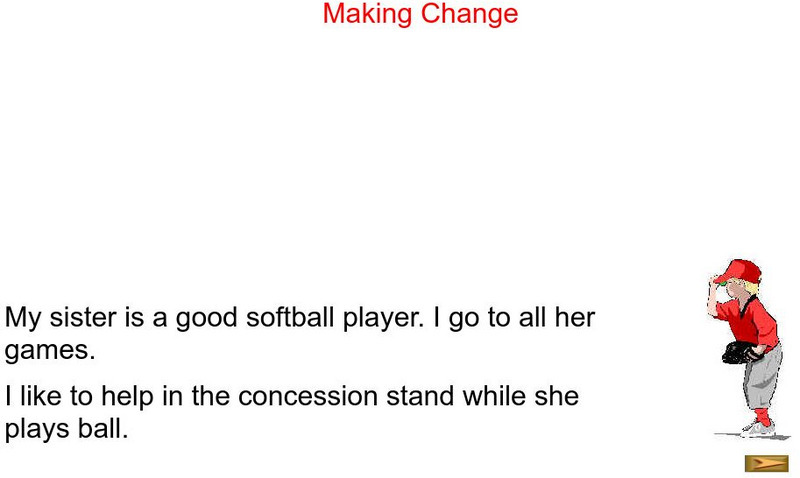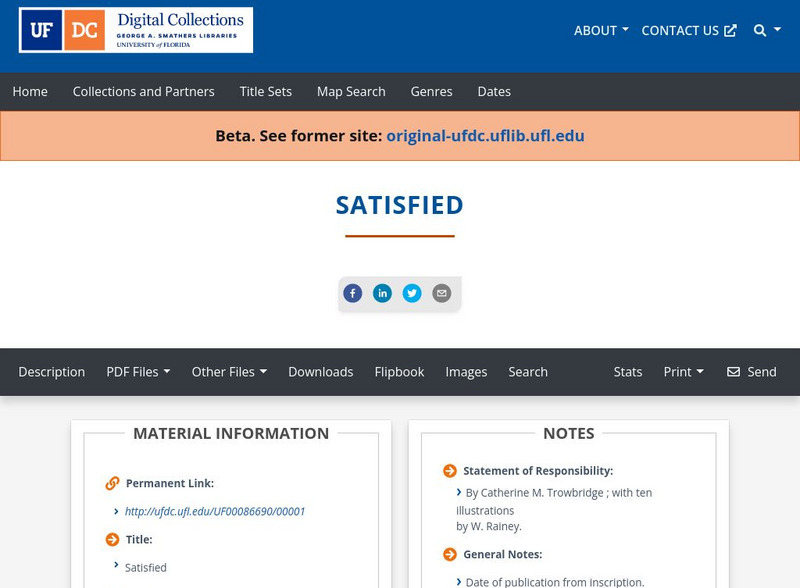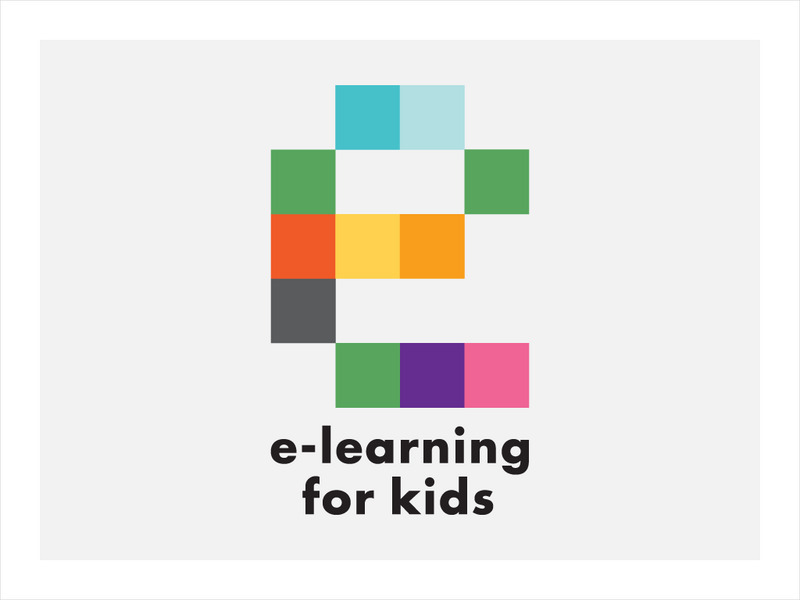Scholastic
Scholastic: Teachers: Student Interviews With Rosa Parks
Excellent questions from students, answered by African American civil rights activist Rosa Parks.
Beacon Learning Center
Beacon Learning Center: Making Change
Students can practice counting coins and making change in this interactive web lesson.
Chase Young, PhD
Dr. Chase Young, Ph D: Reader's Theater Script: A Christmas Story: Shoot Your Eye Out [Pdf]
A reader's theater script for a scene from Jean Shepherd's children's story, A Christmas Story: Shoot Your Eye Out, is provided on these pages. Five character roles are needed in this activity.
Chase Young, PhD
Dr. Chase Young, Ph D: Reader's Theater Script: Get Out of Bed [Pdf]
A reader's theater script for Diane Z. Shore's funny poem, Get Out of Bed, is provided on these pages. Two character roles are needed in this activity.
Chase Young, PhD
Dr. Chase Young, Ph D: Reader's Theater Script: What You Never Knew About Beds, Bedrooms & Pajamas [Pdf]
A reader's theater script for Patricia Lauber's children's book, What You Never Knew About Beds, Bedrooms & Pajamas, is provided on these pages. Eight character roles are needed in this activity.
Chase Young, PhD
Dr. Chase Young, Ph D: Reader's Theater Script: What to Do About Alice? [Pdf]
A reader's theater script for Barbara Kerley's biography of Alice Roosevelt, What to Do About Alice?, is provided on these pages. Five character roles are needed in this activity.
Quia
Quia: Capitalization Flash Cards
This site contains a flash card game with general rules for capitalization of proper nouns and adjectives. Students can choose their difficulty level.
Utah State Office of Education
Utah Science: The Mysterious Force
There is a secret mysterious force in your home right this very moment! Try these activities to first identify that force and then extend your knowledge of the force by investigating the other activities provided.
Capital Community College Foundation
Guide to Grammar and Writing: Fragments and Types of Sentences
Ten questions asking students to identify the difference between complete sentences and sentence fragments.
University of Florida
Baldwin Library: Satisfied
A scanned copy of the 1898 publication of Satisfied by Catharine Maria Trowbridge, a fiction book for children.
E-learning for Kids
E Learning for Kids: Science: California: What Are the Life Processes in Humans?
Johnny is a crab fisherman. He believes crabs are a lot like humans. Listen to his explanation as to why he believes this.
E-learning for Kids
E Learning for Kids: Science: Hawaii: What Are the Life Cycles of Some Animals?
Olina is playing on the beach with the animals. Join her and find out more about life cycles and animals?
E-learning for Kids
E Learning for Kids: Science: Iceland: What Is Electricity?
Go on a fishing trip with Martin and his grandfather. They use a lot of electrical equipment. Help him find out which items use electricity.
E-learning for Kids
E Learning for Kids: Science: Indian Ocean: What Are Mass Amd Weight?
Join Maria and Boris the Astronaut in their journey. Learn about mass, weight, and gravity in space.
E-learning for Kids
E Learning for Kids: Science: North Sea: Netherlands: What Is It Made Of?
Finn is joining his father on their boat. Join them and help Finn sort materials based on their properties.
E-learning for Kids
E Learning for Kids: Science: North Sea: How Do We Choose Materials to Make Objects?
Help Emilie keep the winery stable and sturdy. Join her to learn about different materials and their properties.
E-learning for Kids
E Learning for Kids: Science: Norway: What Do Plants Need to Grow Well?
Join Hilde on her trip through the fjords in Norway. Learn more about plants and how plants are able to grow.
University of Florida
Baldwin Library: The Men of Ware
A scanned copy of the 1880 publication of The Men of Ware by Frederic Edward Weatherly, a book of poetry for children.
University of Florida
Baldwin Library: The Cherry Stones
A scanned copy of the 1851 publication of The Cherry Stones by William Adams, a fiction book for children.
University of Florida
Baldwin Library: The Cherry Stones
A scanned copy of the 1851 publication of The Cherry-stones by William Adams, a fiction book for children.
University of Florida
Baldwin Library: Norton Hargrave, and Other Sketches
A scanned copy of the 1851 publication of Norton Hargrave, and Other Sketches by Jane Alice Sargant, a fiction book for children.
University of Florida
Baldwin Library: Bible History for Children
A scanned copy of the 1898 publication of Bible History for Children by A. G. Kennett-Barrington, a religious book for children.
University of Florida
Baldwin Library: A Bible Picture Book for Catholic Children
A scanned copy of the 1898 publication of Bible History for Children by A. G. Kennett-Barrington, a religious book for children.
Polk Brothers Foundation Center for Urban Education at DePaul University
De Paul University: Center for Urban Education: Read to Learn, Share What You Learn [Pdf]
Several tips for reading to learn are provided on this page. Students will explore the BIG idea presented in a nonfiction piece.




![Dr. Chase Young, Ph D: Reader's Theater Script: A Christmas Story: Shoot Your Eye Out [Pdf] Activity Dr. Chase Young, Ph D: Reader's Theater Script: A Christmas Story: Shoot Your Eye Out [Pdf] Activity](https://d15y2dacu3jp90.cloudfront.net/images/attachment_defaults/resource/large/FPO-knovation.png)
















